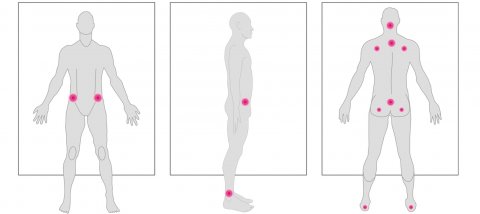Sores Prevention
What are bedsores?
Pressure ulcers are a condition of the skin caused by the following factors:
Localized ischemia due to pressure - the lack of air in the cells dies, and the skin is again exposed to the pressure that causes inflammation - which quickly leads to the formation of pressure sores.
Friction. The skin is weakened or even damaged as a result of rubbing the epidermis. Skin irritation promotes coagulation.
Moisturizing - occurs when the skin is constantly exposed to moisture, which makes it soft, providing easy access to infections. Wipeout called:
sweat
urine
Body fluid released from wounds
What contributes to the appearance of pressure sores?
Limited movement - restrictions, disability, etc.
Epidermal damage or abrasion
Improper skin care
Common health problems - malnutrition, protein deficiency, blood electrolytes
Atherosclerosis, diabetes
Long-term effects of moisture that may be caused by a choice of products that solve urinary incontinence
Too high room temperature, causing excessive sweating and abrasions on the skin
Clothing and bedding made of artificial skin irritants
Outer seam clothing, buttons, food crumbs on the mattress.
Places where sleep deprivation occurs most often:

5 stages of bedsores
There are five types of pressure sores, depending on their level of development:
STAGE I - redness, which disappears with the release of pressure; no skin damage.
STAGE II - redness that does not disappear with the release of pressure; puffiness of the surface, skin erosion; painful damage to the epidermis.
STAGE III - Deep skin lesion reaching the dermis (deeper skin structures); visible, irritated, irritated lesion; the lower part of the wound may be covered with damaged tissue (yellow mass) or pinkish-granular.
STEP IV - the lesion spreads to the bone and skin necrosis develops; dead tissue is visible, the lower part of the wound can be filled with black necrotic tissue.
STEP V - The last stage - necrosis spreads to the muscles that can cause sepsis.
Therapy for the prevention of pressure sores
Healthy people, able to control their muscles and respond to pressure, will never be deprived of pressure sores. Their education in people with reduced mobility can be significantly reduced by preventing pressure sores.
Do not ignore the symptoms.
Redness of the skin that does not disappear when the pressure is relieved, the epidermis of the bladder that develops in the area where the pressure is applied - these symptoms should be disturbing often. Continuous skin monitoring is an important element in the prevention of pressure sores.
Try to Avoid Risk Factors
Body positioning should be performed regularly, every 2-3 hours.
Reduce pressure on the skin if the person you care for has pressure sores.
Remember to put a pillow between your legs when you put one person on one side.
Get rid of rubberized bedspreads - they tend to curl, which puts pressure on the skin and prevents air from entering.
Bed sheets should never be wet - change bed sheets if the person you care for wets the bed.
Avoid injury - including scratches. Trim your favorite nails.
Use special devices to prevent pressure sores.
Mattress for bedsores
Sleeping pillows
Sleeping mattresses
Special bed and carpet coverings
Sliding covers and equipment for moving a person to bed.
Try to get as much movement for your loved one as possible.
Encourage the person you love to move as much as possible.
Try taking action to increase mobility.
Do not let go of the person you are caring for.
Use skin care products
Cleanse your skin thoroughly with special cosmetics.
Avoid using products that can affect the skin excessively. Also, avoid using the powder with fatty foods such as butter or a nourishing cream.
Remember the intimate hygiene of the person you care about - clean these parts of the body with mild detergents and apply the necessary protective equipment.
Check your skin daily - react immediately if you find something disturbing.
Activate your skin by massaging it - it is best to use a massage gel, avoid the use of alcohol-containing products, as they dry the skin.
Provide healthy food to the person you care about
Daily nutrition should provide the body with all the nutrients, vitamins and trace elements that it needs.
The menu should include cereals, dairy products, legumes, meat, fish, fruits and vegetables.
It is recommended to increase the amount of protein in food for a while if a pressure sore begins.
Sweets, animal fats and salt intake should be minimized or avoided altogether.
If you get pressure sores, you should see a doctor immediately to make a treatment plan. Sleep treatment takes a lot of time. This is a complex process, but if you follow your doctor’s instructions, you can treat pressure sores.
Remember: the sooner you begin to take the necessary steps, the faster and more effective your treatment will be.
Remember, this is easier to prevent than to cure.
Here you can find more information on proper skin care. Get practical tips on caring for your loved ones.
